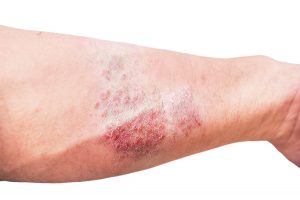Researchers at Oxford University investigated a new drug that cures eczema in one day. The form of eczema they researched has the name “atopic dermatitis”. Other studies have shown that this type of eczema is due to an autoimmune reaction. It involves a white blood cell type called eosinophils and specific antibodies. Atopic dermatitis is a condition, which runs in families. In addition, there are triggering factors that cause a flare-up of eczema in those who are vulnerable to get it.
Proof-of-concept study at Oxford University
Researchers at the Oxford University took 12 subjects and gave them one dose of etokimab. After 29 days 83% of the subjects had a positive response with improvements of their skin rashes. The investigators scored this according to a standard scoring method; the skin severity had improved by at least half. There was a 40% reduction in the count of eosinophils in the blood stream. Eosinophils are linked to how sensitive a person is with regard to the reaction of allergens.
The lead researcher, Prof. Graham Ogg stated: ”This clinical trial is the first time we’ve looked at how blocking IL-33 can help people with atopic dermatitis, and we have found they experienced significant improvement in their symptoms after a single dose.”
Inhibition of the alarmin cytokine IL-33
The clinical trial involved inhibition of the alarmin cytokine IL-33 by an IgG1 anti–IL-33 monoclonal antibody under the name of etokimab. Etokimab also suppressed neutrophil invasion of a test site with house dust compared to subjects treated with a placebo. The improvement of eczema with etokimab and the lack of neutrophil migration into the test area with house dust supports the idea that IL-33 is involved in causing eczema (atopic dermatitis).
Discussion
Prof. Graham Ogg went on to say: “These results are only very preliminary, and we need to be cautious, but we’re currently testing the therapy in a larger double-blind randomized trial in people with atopic dermatitis, and we look forward to seeing the results”. This new clinical trial includes 300 people, and it aims at confirming that etokimab will suppress atopic dermatitis effectively.
Conclusion
A new approach to treating eczema (atopic dermatitis) with an antibody against the alarmin cytokine IL-33, namely etokimab is a unique therapeutic approach. Researchers noted that only one treatment with etokimab resulted in a significant improvement of the eczema and also reduced the eosinophils in the blood, a white blood cell type involved in allergic reactions. In addition, etokimab suppressed neutrophil invasion of a test site with house dust compared to subjects that received a placebo. The researchers believe that other immune diseases may be treatable with this new clinical approach. So far none of the patients experienced any side effects. Further research is necessary to show the application in other immune diseases.







